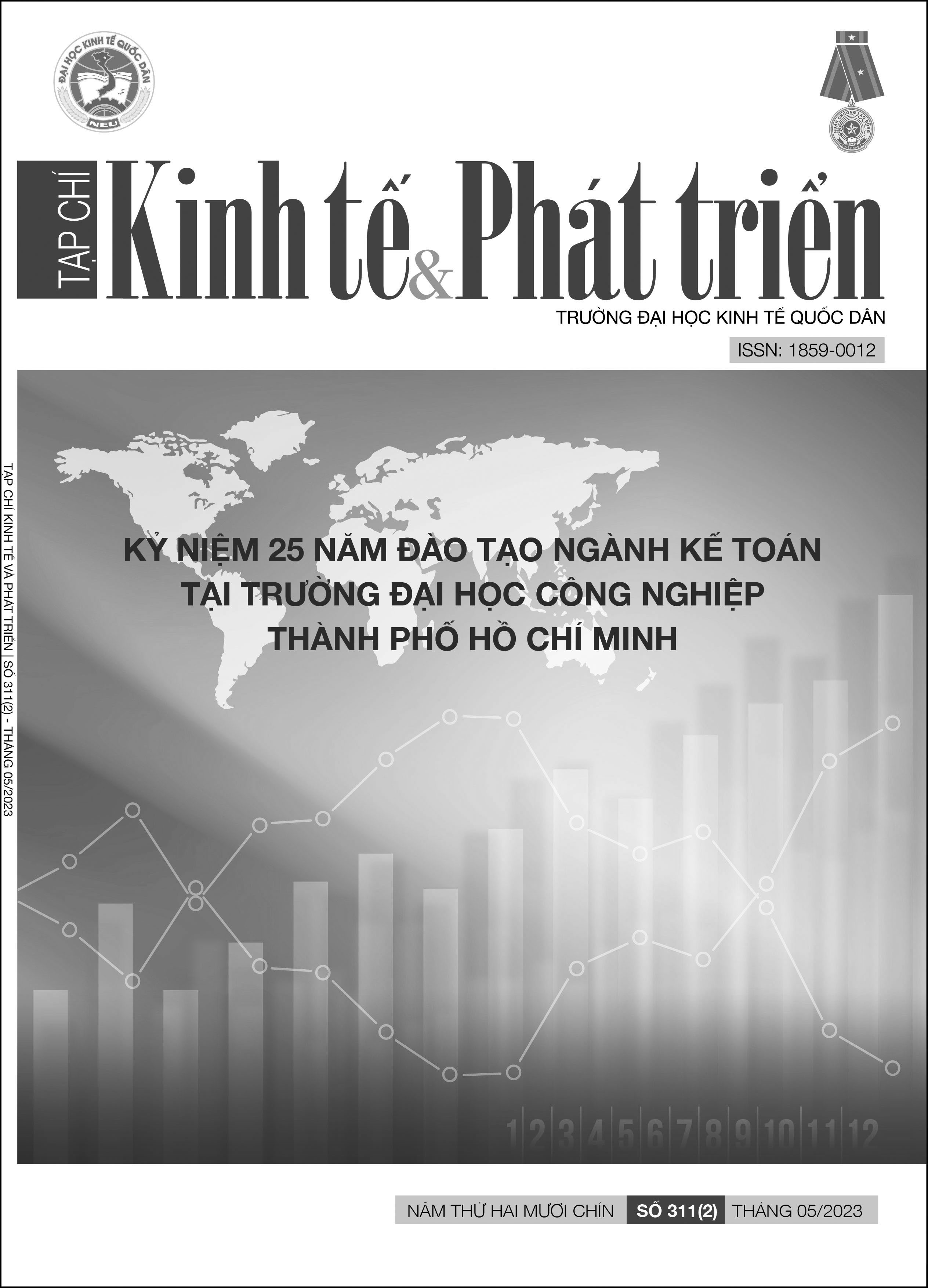ESG trong môi trường bất định Covid-19: Nghiên cứu thực nghiệm tại các doanh nghiệp Việt Nam
DOI:
https://doi.org/10.33301/JED.VI.900Từ khóa:
Báo cáo phát triển bền vững, Covid-19, doanh nghiệp niêm yết, ESGTóm tắt
Đại dịch Covid-19 đã gây nhiều khó khăn, tổn thất về người, kinh tế cho các doanh nghiệp tại Việt Nam cũng như trên toàn thế giới. Tuy nhiên, thống kê cho thấy doanh nghiệp nào theo đuổi chiến lược phát triển bền vững, công bố các chỉ tiêu ESG (Enviromental – môi trường, Social – xã hội, Governance – quản trị) trong nhiều năm qua luôn thu hút được sự đồng hành của các nhà đầu tư trong và ngoài nước. Bên cạnh đó doanh nghiệp cũng đã thể hiện khả năng thích ứng và tự tạo ra được “kháng thể” trước đại dịch; duy trì ổn định hoạt động và tăng trưởng trong kinh doanh, đóng góp tích cực trong việc thực hiện mục tiêu kép. Nghiên cứu này nhằm nhận diện rõ thực trạng công bố các chỉ tiêu ESG trong báo cáo phát triển bền vững hiện nay tại các doanh nghiệp niêm yết trên sàn giao dịch tại Việt Nam, từ đó đưa ra các gợi ý chính sách về giải pháp nhằm tạo điều kiện thuận lợi cho việc thực hiện công bố các chỉ tiêu ESG trong thời gian tới.
Tài liệu tham khảo
Ấn tượng Top 10 doanh nghiệp làm báo cáo phát triển bền vững tốt nhất (2020), truy cập lần cuối ngày 24 tháng 5 năm 2022, từ <https://www.tinnhanhchungkhoan.vn/an-tuong-top-10-doanh-nghiep-lam-bao-cao-phat-trien-ben-vung-tot-nhat-post256704.html>.
Bouslah, K., Kryzanowski, L. & M’Zali, B. (2013), ‘The impact of the dimensions of social performance on firm risk’, Journal of Bank & Finance, 37, 258–1273.
Brammer, S., Branicki, L. & Linnenluecke, M.K. (2020), ‘COVID-19, societalization, and the future of business in society’, Academy of Management Perspectives, 34(4), 493-507.
Chang, K., Kim, I. & Li, Y. (2014), ‘The heterogeneous impact of corporate social responsibility activities that target different stakeholders’, Journal of Business Ethics, 125, 211–234.
Cheng, B., Ioannou, I., & Serafeim, G. (2014), ‘Corporate Social Responsibility and Access to Finance’, Strategic Management Journal, 35, 1-23.
Credit Suisse (2020), ESG investing during coronavirus and beyond, retrived on October 12th, 2022, from <https://www.credit-suisse.com/microsites/apac/esg-conference/home/insights/esg-investing-during-coronavirus-and-beyond.html>.
Cotter, J., Najah, M. & Wang, S. (2011), ‘Standardized reporting of climate change information in Australia’, Sustainability Accounting, Management and Policy Journal, 2(2), 294-321.
Eccles, N. & Viviers, S. (2011), ‘The origins and meanings of names describing investment practices that integrate a consideration of ESG issues in the academic literature’, Journal of Business Ethics, 104(3), 389-402.
Endrikat, J., Guenther, E. & Hoppe, H. (2014), ‘Making sense of conflicting empirical findings: a meta-analytic review of the relationship between corporate environmental and financial performance’, European Management Journal, 32(5), 735-751.
Freeman, R.E. (2010), Strategic management: a stakeholder approach, Cambridge University Press, Cambridge.
Godfrey, P.C. (2005), ‘The Relationship between Corporate Philanthropy and Shareholder Wealth: A Risk Management Perspective’, Academy of Management Review, 30, 777-798.
Godfrey, P.C., Merrill, C.B. & Hansen, J.M. (2009), ‘The Relationship between Corporate Social Responsibility and Shareholder Value: An Empirical Test of the Risk Management Hypothesis’, Strategic Management Journal, 30, 425-445.
Gramlich, D. & Finster, N. (2013), ‘Corporate sustainability and risk’, Journal of Business Economics, 83(6), 631–664.
Gray, J. (2012), ‘Misadventures of an irresponsible investors’, Rotman International Journal of Pension Management, 5(2), 8-13.
Greening, D.W. & Turban, D.B. (2000), ‘Corporate Social Performance as a Competitive Advantage in Attracting a Quality Workforce’, Business & Society, 39(3), 254–280.
Luo, X. & Bhattacharya, C. (2009), ‘The Debate over Doing Good: Corporate Social Performance, Strategic Marketing Levers, and Firm-Idiosyncratic Risk’, Journal of Marketing, 73(6), 198–213.
Nguyễn Thị Minh Hằng (2020), ‘Ảnh hưởng của đại dịch COVID-19 đến người lao động tại các doanh nghiệp dịch vụ’, Tạp chí Kinh tế và Dự báo, 11, 31-34.
Oikonomou, I., Brooks, C. & Pavelin, S. (2012), ‘The Impact of Corporate Social Performance on Financial Risk and Utility: A Longitudinal Analysis’, Financial Management, 41(2), 483–515.
Phạm Hồng Chương và nhóm nghiên cứu (2020), ‘Tác động của đại dịch Covid-19 đến nền kinh tế Việt Nam’, Tạp chí Kinh tế và Phát triển, 274, 2-13.
Plumlee, M., Brown, D., Hayes, R.M. & Marshall, R.S. (2015), ‘Voluntary environmental disclosure quality and firm value: further evidence’, Journal of Accounting and Public Policy, 34, 336–361.
Sparkes, R. (2001), ‘Ethical investment: whose ethics, which investment?’, Business Ethics: A European Review, 10(3), 194-205.
Varenova, D., Samy, M. & Combs, A. (2013), ‘Corporate social responsibility: trade-off or synergy: perceptions of executives of FTSE all-share companies’, Sustainability Accounting, Management and Policy Journal, 4(2), 190-215.





